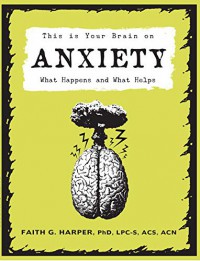Familiar Diversions
I'm a librarian who loves anime, manga, and reading a wide variety of genres.
Currently reading
This Is Your Brain on Anxiety: What Happens and What Helps by Faith G. Harper

In this very short book (63 pages), Faith Harper briefly covers what anxiety is, how to tell if you have it, immediate and long-term methods for dealing with it, and how to help a friend dealing with it. I read it because I have anxiety and have spent most of my life "dealing" with it by either arranging things so that I can avoid my known triggers or somehow powering through the panic. But sometimes my triggers are unavoidable or unpredictable, and sometimes I'm not able to power through.
Since this seems to come up a lot in negative reviews of this book, I feel I should note that Harper's style is very conversational and she uses swear words several times. If you think this would bother you, you should probably avoid this book.
Anyway, I read this from start to finish today. A lot of the tips are the sorts of things you need to try out in the midst of a panic attack or over a long period of time, so it's tough for me to say how helpful they are. However, most of the listed methods for dealing with anxiety seemed simple enough to practice and try, and the book is small enough and skinny enough to fit into a purse or backback for times when you need reminders of the various tips or just reassurance that your anxiety does not make you a complete failure. Many of the tips, like deep breathing and meditation, were the sort of thing you could easily find online, but constant internet access is not guaranteed, and internet searching is not always possible or a good idea depending on the source of your anxiety and/or how anxious you currently feel.
I'm still a bit skeptical about the helpfulness of some of the more immediate tips for dealing with anxiety, but, like I said, they all sounded pretty simple and worth a shot. The ABCDE model for more long-term training seemed much more difficult. How do you deal with D (Dispute) when your fears aren't totally unjustified? I suspect I'll probably have to work on this with a friend or family member, someone who can give me a reality check when necessary or come up with answers I have trouble seeing.
Things that, as far as I can remember, this book doesn't bring up: medication and getting professional help. I suspect this ties in with the author's recognition of the ways a lack of privilege can affect anxiety. Both of those options require things like money, decent insurance, and the right services in your area. Harper mentioned early on that she's a therapist who has worked with clients who have anxiety, so there was at least a background awareness of this option, but the assumption seemed to be that, if you wanted to seek professional help and were able to, you'd already be doing so or would do so when you were ready.
All in all, this seemed like a decent anxiety self-help book. My library due date isn't for a while yet, so I'll keep it and practice some of the tips it talked about. There's also a good chance I'll buy a copy for myself. It really would fit nicely in my purse, and it's cheap.
(Original review posted on A Library Girl's Familiar Diversions.)













 5
5
 6
6